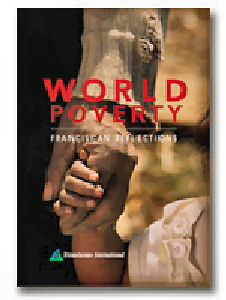
|
Posted July 7, 2008
Book: World Poverty: Franciscan Reflections The Franciscan International Study Centre Franciscans International, New York, 2008. Pp. 216 An Excerpt from the Jacket:
How do we understand poverty in our own communities? What does international human rights law have to say? How can the spirit of St. Francis inspire us to address poverty today? This volume provides a solid foundation to begin answering these questions. An Excerpt from the Book: One sees that the notion that Francis the “Poverello” had of poverty is much more complex and nuanced than one might think. There is one form of poverty — that of God and of his Christ — that every Christian is duty bound to imitate. This poverty consists in transcending of self through love, in a dependence upon others, in sharing of what one is and what one possesses, in humble service (foot-washing). The other poverty, that of lacking, of insufficiency, which disfigures and destroys human grandeur, is an evil that God detests and that humanity should strive to eliminate. “That there may be no poor among you.” When, despite this, Francis, with his brothers, decides to lead a life of precarity and social poverty, he carries out a prophetic act that the situation of the Church required but which he did not propose to Christians living in the world. Who are the poor for Francis? Francis and his fraternity situated themselves at the beginning of their spiritual enterprise, in the category of the poor, while being conscious that being voluntarily poor, recognized as such by society and the Church, was not the same as involuntary poverty. Nevertheless, Francis seemed to know well the world of the poor of his time. A passage of the Earlier Rule (9:2) presents a complete and well worked out list and alludes to the relationship of the friars with the poor. It is worth quoting it in its entirety. “The brothers should rejoice when they live among base and despised people, among the poor and the infirm sick and lepers and beggars along the roads.” Base and despised: these first two terms express the judgement that is usually brought upon those who today one would qualify as marginal, excluded, homeless, “untouchable.” The five following qualifiers seek to determine their condition and the cause of their exclusion. General poverty first of all (lack of necessary clothing, food, dwelling space), state of health follows, which is detailed in the three terms: infirm (fragile of body), the frankly sick, and finally the heights of misery, the absolutely marginalized of the Middle Ages — the lepers. And to complet the list, beggars — not the dishonourable ones who, as occurs among the friars, beg from door to door — but those seated beside the highways. The text presupposes that the friars sometimes find themselves in contact with this world, live among them. We could not say whether the friars do so in order to share their condition or to serve them and raise them out of it. But it is implied that it is not always with a light heart that they find themselves there, since they are invited to “rejoice” when it occurs. To this list another qualifier should be added relative to a moral category of poverty: those who are dangerous, detested and rejected by all. “Whoever comes to the brothers, friend or adversary, theif or brigand, may he be received with kindness.” In all these poor humans Francis saw, in the words of his biographer, Thomas of Celano, “the noble symbol of Christ” who made himself poor for us. Table of Contents: 1. The Franciscan Concept of Poverty 2. The rights of the poor: a milestone on a long road 3. Poverty and the right to development 4. Millennium Development goals on poverty reduction and hunger 5. The role of women in the fight against poverty 6. Poverty and aging 7. Is migration increasing poverty or reducing it? 8. Poverty and disability 9. The fight against illiteracy, functional illiteracy, and marginalization: A friar minor reflects on poverty in France 10. Poverty and environmental justice in California’s great central valley |
|
